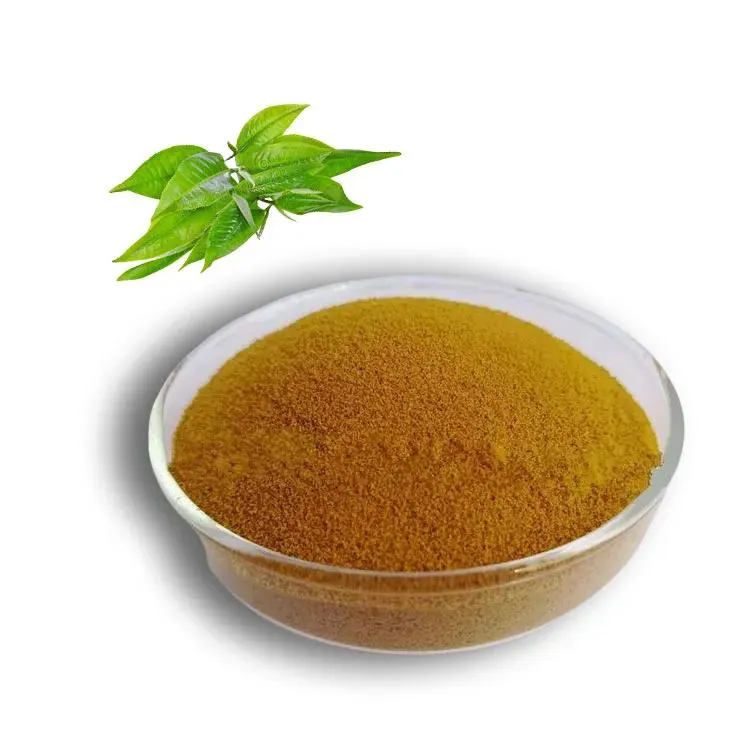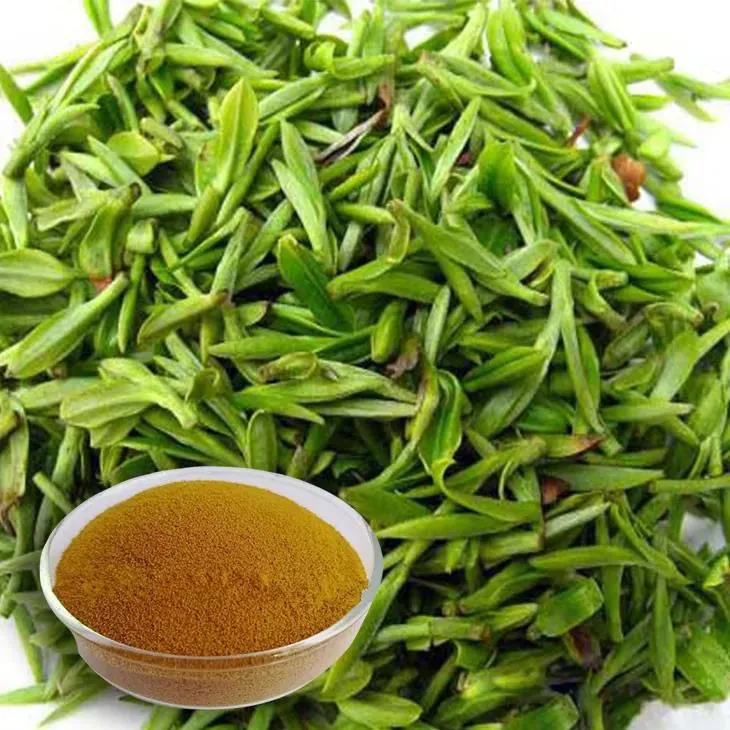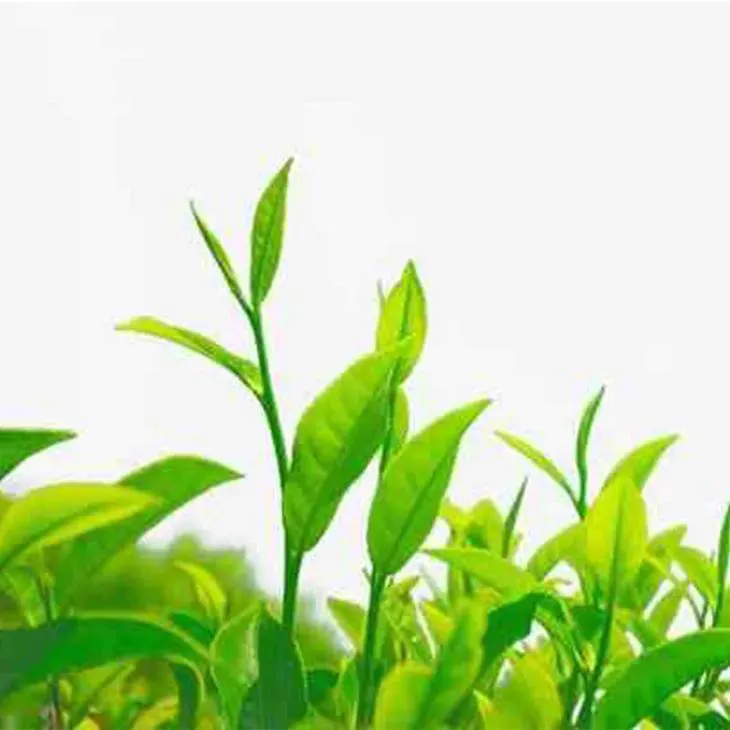- 0086-571-85302990
- sales@greenskybio.com
Powerful Green Tea Extract: Its Role in Athletic Performance
2024-11-12

Introduction
Green tea has been consumed for centuries, not only for its refreshing taste but also for its potential health benefits. In recent years, the focus has shifted towards its role in athletic performance. The Green Tea Extract, which is rich in various bioactive compounds, has emerged as a promising supplement for athletes and fitness enthusiasts. This article will explore the multiple ways in which Green Tea Extract can impact athletic performance, from enhancing metabolism to promoting muscle recovery.

The Composition of Green Tea Extract
Green tea extract is a concentrated form of the compounds found in green tea leaves. The two main components that are of particular interest in relation to athletic performance are catechins and caffeine.
Catechins
Catechins are a type of flavonoid, and green tea contains several types, with epigallocatechin gallate (EGCG) being the most abundant and well - studied. Catechins are known for their antioxidant properties, which play a crucial role in protecting the body's cells from damage caused by free radicals. In the context of athletics, this antioxidant activity can help reduce exercise - induced oxidative stress, which is associated with muscle fatigue, inflammation, and impaired performance.
Caffeine
Caffeine is a well - known stimulant that is also found in coffee, energy drinks, and other products. In green tea, the caffeine content is lower compared to coffee, but it still has a significant impact. Caffeine can increase alertness, reduce perceived exertion during exercise, and enhance fat metabolism. These effects can contribute to improved athletic performance, especially in endurance - based activities.

Metabolic Boost and Energy Expenditure
One of the key benefits of green tea extract for athletic performance is its potential to boost metabolism. Metabolism refers to the chemical processes that occur within the body to convert food into energy. Green tea extract may increase energy expenditure in several ways:
- Thermogenesis: Green tea extract can stimulate thermogenesis, which is the production of heat in the body. This process requires energy, and as a result, more calories are burned. Catechins, especially EGCG, have been shown to increase thermogenesis by activating brown adipose tissue (BAT). BAT is a type of fat tissue that burns calories to generate heat, rather than storing them like white adipose tissue. By increasing the activity of BAT, green tea extract can contribute to increased energy expenditure during rest and exercise.
- Fat Oxidation: Another aspect of the metabolic boost is the enhanced fat oxidation. Caffeine in green tea extract can mobilize fatty acids from adipose tissue and increase their availability for oxidation. During exercise, the body can then use these fatty acids as an energy source instead of relying solely on carbohydrates. This can be particularly beneficial for endurance athletes, as it helps to preserve glycogen stores in the muscles. Glycogen is the primary source of energy during high - intensity exercise, and by sparing glycogen, athletes can delay the onset of fatigue and improve their performance.

Antioxidant Protection Against Oxidative Stress
Exercise induces oxidative stress, which is characterized by an imbalance between the production of reactive oxygen species (ROS) and the body's antioxidant defense mechanisms. ROS can damage cells, proteins, and DNA, leading to muscle fatigue, inflammation, and reduced performance. Green tea extract, with its high content of catechins, can help combat oxidative stress in several ways:
- Scavenging Free Radicals: Catechins act as free - radical scavengers, neutralizing ROS before they can cause damage. EGCG, in particular, has been shown to be a very effective antioxidant, capable of reducing oxidative damage in various tissues, including muscle tissue. By reducing oxidative stress, green tea extract can help athletes recover faster from workouts and maintain a higher level of performance over time.
- Enhancing Antioxidant Enzymes: Green tea extract can also upregulate the activity of antioxidant enzymes in the body. These enzymes, such as superoxide dismutase (SOD), catalase (CAT), and glutathione peroxidase (GPx), play a vital role in the body's natural antioxidant defense system. By increasing the activity of these enzymes, green tea extract can further strengthen the body's ability to combat oxidative stress.
Effects on Blood Flow
Improved blood flow is essential for athletic performance, as it ensures that oxygen and nutrients are delivered to the working muscles efficiently. Green tea extract may have positive effects on blood flow through the following mechanisms:
- Nitric Oxide Production: Green tea extract can stimulate the production of nitric oxide (NO) in the endothelial cells that line the blood vessels. NO is a vasodilator, which means it relaxes the smooth muscle in the blood vessel walls, causing them to dilate. This dilation allows for increased blood flow, delivering more oxygen and nutrients to the muscles. Improved blood flow can enhance exercise performance, especially in activities that require high - intensity contractions, such as weightlifting or sprinting.
- Anti - Inflammatory Effects: The anti - inflammatory properties of green tea extract can also contribute to improved blood flow. Inflammation in the blood vessels can lead to endothelial dysfunction, which impairs blood flow. By reducing inflammation, green tea extract can help maintain healthy blood vessels and optimal blood flow, which is beneficial for athletes.
Muscle Recovery and Adaptation
Recovery is a crucial aspect of athletic performance, as it allows the body to repair and adapt to the stress of exercise. Green tea extract may play a role in muscle recovery and adaptation in the following ways:
- Reducing Muscle Soreness: Exercise - induced muscle soreness, also known as delayed - onset muscle soreness (DOMS), can limit an athlete's ability to train consistently. Green tea extract's antioxidant and anti - inflammatory properties may help reduce DOMS. By reducing oxidative stress and inflammation in the muscles, it can alleviate the pain and discomfort associated with DOMS, allowing athletes to recover faster and get back to training sooner.
- Enhancing Muscle Protein Synthesis: Muscle protein synthesis is the process by which the body builds new muscle tissue. Green tea extract may have a positive impact on muscle protein synthesis, potentially through its effects on insulin sensitivity and mTOR signaling pathway. By promoting muscle protein synthesis, green tea extract can help athletes build and maintain muscle mass, which is important for strength and power - based sports.
Considerations for Use
While green tea extract shows great potential in enhancing athletic performance, there are some considerations for its use:
- Dosage: The optimal dosage of green tea extract for athletic performance is not yet fully established. It is important to follow the recommended dosages provided by manufacturers or consult a healthcare professional. Taking too much green tea extract may lead to adverse effects, such as nausea, insomnia, or increased heart rate, due to its caffeine and catechin content.
- Quality and Purity: The quality and purity of green tea extract products can vary widely. Athletes should choose high - quality products from reputable manufacturers to ensure that they are getting a safe and effective supplement. Look for products that are standardized for their catechin content and free from contaminants.
- Individual Variability: Everyone's body responds differently to green tea extract. Some athletes may experience significant benefits, while others may not notice much of a difference. Factors such as genetics, diet, and training regimen can all influence the effectiveness of green tea extract.
Conclusion
In conclusion, green tea extract is a powerful supplement with the potential to enhance athletic performance in multiple ways. Its combination of catechins and caffeine can boost metabolism, reduce oxidative stress, improve blood flow, and aid in muscle recovery. However, athletes should be aware of the considerations for its use, such as dosage, quality, and individual variability. With further research, green tea extract may become an even more integral part of the sports nutrition toolkit, helping athletes reach their full potential.
FAQ:
What are the main components in green tea extract that are beneficial for athletic performance?
The main components in green tea extract that are beneficial for athletic performance are catechins and caffeine. Catechins have antioxidant properties, and caffeine can boost metabolism and increase energy.
How does green tea extract boost metabolism during exercise?
The caffeine in green tea extract is likely to play a role in boosting metabolism during exercise. It may stimulate the body's systems to burn more calories, leading to increased energy expenditure.
Can green tea extract really help with muscle recovery?
There is potential for green tea extract to help with muscle recovery. Its antioxidant properties can reduce exercise - induced oxidative stress, which may in turn aid in the recovery process of muscles. However, more research is still needed to fully understand the mechanisms and the extent of its effect.
How does green tea extract reduce exercise - induced oxidative stress?
The catechins in green tea extract, which are antioxidants, can neutralize free radicals that are produced during exercise. These free radicals can cause oxidative stress, and by neutralizing them, green tea extract helps to reduce this stress.
Is there evidence of green tea extract improving blood flow during exercise?
There is some evidence suggesting that green tea extract may have an impact on blood flow during exercise. However, the exact mechanisms are not yet fully understood. Some studies indicate that certain components in green tea extract may cause blood vessels to dilate, potentially improving blood flow.
Related literature
- The Effects of Green Tea Extract on Exercise Performance: A Review"
- "Green Tea Catechins and Athletic Performance: An Update"
- "Role of Caffeine in Green Tea Extract for Enhancing Sports Capabilities"
- ▶ Hesperidin
- ▶ citrus bioflavonoids
- ▶ plant extract
- ▶ lycopene
- ▶ Diosmin
- ▶ Grape seed extract
- ▶ Sea buckthorn Juice Powder
- ▶ Beetroot powder
- ▶ Hops Extract
- ▶ Artichoke Extract
- ▶ Reishi mushroom extract
- ▶ Astaxanthin
- ▶ Green Tea Extract
- ▶ Curcumin Extract
- ▶ Horse Chestnut Extract
- ▶ Other Problems
- ▶ Boswellia Serrata Extract
- ▶ Resveratrol Extract
- ▶ Marigold Extract
- ▶ Grape Leaf Extract
- ▶ blog3
- ▶ blog4
- ▶ blog5
-
Organic Tongkat Ali extract powder factory.
2024-11-12
-
How to make powder with ashwagandha extract.
2024-11-12
-
Rosehip extract manufacturers from China.
2024-11-12
-
The best cat's claw extract in nature.
2024-11-12
-
Chinese Dandelion Leaf Extract Suppliers.
2024-11-12
-
Acerola Extract
2024-11-12
-
Phyllanthus Emblica Extract
2024-11-12
-
Eucommia Ulmoides Extract
2024-11-12
-
Hesperidin
2024-11-12
-
Peppermint Extract Powder
2024-11-12
-
Elderberry Extract
2024-11-12
-
Lotus leaf extract
2024-11-12
-
Milk Thistle Extract
2024-11-12
-
Bitter Melon Extract
2024-11-12
-
Polygonum multiflorum extract
2024-11-12





















